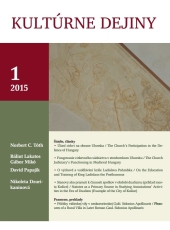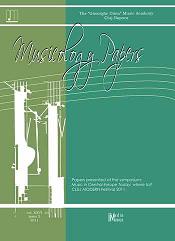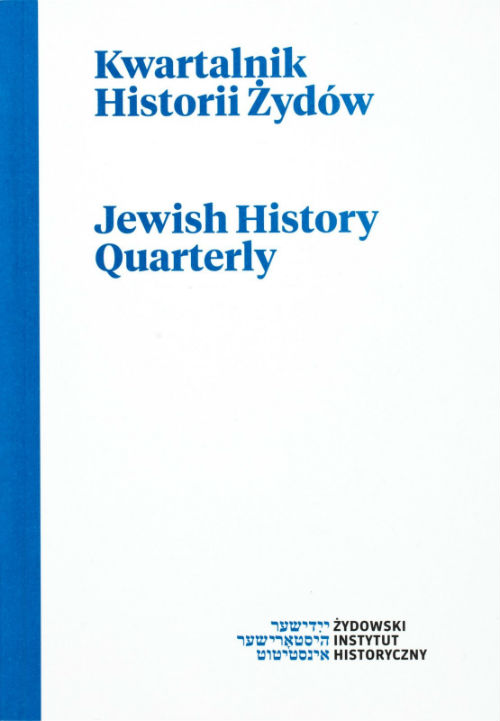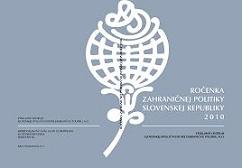Anotácie, nové knihy
Author(s): Jaroslav Nemeš,Štefan Valášek,Ján Golian,Lukáš Tkáč,Kristína Kecsöová,Monika Tatáriková,Matej Tatarka,Katarína Furdáková,Michaela Šefranková,Michal Čakloš,Barbora Protušová,Milan Stehlík,René Vladár,Anna Smreková / Language(s): Slovak
/ Issue: 1/2015
Keywords: Annotations; New books
LE GOFF, Jacques. O hranicích dějinných období : Na příkladu strědověku a renesance. Z franc. orig. prel. Martin Pokorný. Praha : Karolinum, 2014, 89 s. ISBN 978-80-246-2784-7.
JANKOVIČ, Ľubomír. Inkunábuly - umenie európskych knižných tvorcov 15. storočia v zbierke Slovenskej národnej knižnice. Martin : Matica slovenská, 2014, 358 s. ISBN 978-80-8149-041-5.
KLOKNER, Tomáš a kol. Až za hranicu oikumeny : Aktuálne otázky z dejín a kultúry antického staroveku. 1. vyd. Brno : Tribun EU, s.r.o., 2012, 328 s. ISBN 978-80-263-0267-4.
VALACHOVIČ, Pavol - HABAJ, Michal. Staroveké civilizácie : Chetiti a Peržania. Trnava : Univerzita sv. Cyrila a Metoda v Trnave, 2013, 203 s. ISBN 978-80-8105-500-3.
Templársky rád v Európe v kontexte historického vývoja Žilinského kraja : zborník zo sympózia. Ed. Jaroslav Velička a kol. Žilina : Žilinský samosprávny kraj, 2013, 120 s. ISBN 978-80-971350-0-3.
FERDINAND, Uličný. Dejiny Slovenska v 11. až 13. storočí. Bratislava : Veda, 2013, 568 s. ISBN 978-80-224-1292-6.
KOWALSKI, Jacek - RATAJCZAK, Tomasz (red.). Międzypanem a plebanem. Wieś, miasto, władzaświecka i duchowna w kulturze średniowiecznej Europy. Poznaň : Wydawnictwo PTPN, 2013, 500 s. ISBN 978-83-7654-238-6.
ANDERSON, James Maxwell. Daily life during the Reformation. Santa Barbara : Greenwood, an imprint of ABC-CLIO, 2011, 257 s. ISBN 978-0-313-36323-8.
MOLDA, Rastislav. Cestopisné denníky štúrovcov. Martin : Matica slovenská, 2014, 256 s. ISBN 978-80-8128-118-1.
KNOPP, Guido. Hitler : pět tváří jeho osobnosti. Z nem. originálu prel. Hanuš Karlach. 3. vydanie. Praha : Euromedia Group; Ikar, 2013, 304 s. ISBN 978-80-249-1115-1.
HILAROVÁ, Dagmar. Nemám žiadne meno : autobiografia ženy uväznenej v Terezíne. Praha : Fragment, 2012, 96 s. ISBN 978-80-8089-616-4.
TANCER, Jozef. Neviditeľné mesto. Prešporok / Bratislava v cestopisnej literatúre. Bratislava : Kalligram, 2013, 304 s. ISBN 978-80-8101-665-3.
POKLUDA, Zdeněk. Baťa v kostce. Zlín : Kniha Zlín, 2013, 112 s. ISBN 978-80-7473-126-6.
Historická demografie, 2014, roč. 38, č. 1 a 2. Praha : Etnologický ústav Akadémie věd České republiky, 262 s. ISSN 0323-0937.
Aero, roč. 1, č. 1 : ŠNAJDR, Miroslav. Vickers Wellington Mk. I. a Aero, roč. 1, č. 2 : IRRA, Miroslav. Avia S/CS-92. Me 262 v československém letectvu. Nevojice : Jakab publishing, 2014. ISSN 2336-4645.
Acta historica Neosoliensia. Vedecký časopis pre historické vedy, 17/2014, č. 1-2, 412 s. ISSN 1336-9148.
More...




